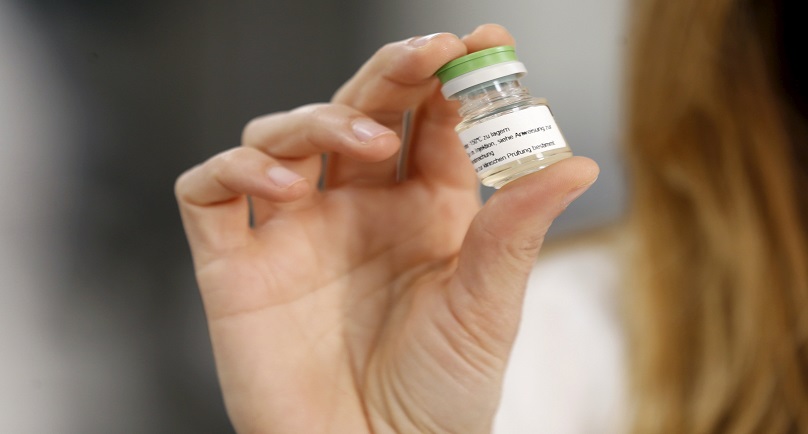Image: Esther Lukasiewicz Hagai, Vice President of Medical and Clinical Affairs at Pluristem Therapeutics, holds a bottle of radiation therapy injection during an interview with Reuters in Haifa, Israel March 6, 2016. REUTERS/Baz Ratner
![]()
By Elana Ringler
Israeli biotech firm Pluristem Therapeutics said it hopes its anti-radiation therapy will protect Fukushima workers decommissioning nuclear reactors and save lives in the future if ever a similar catastrophe occurs.
The Haifa-based company’said they have developed a placenta-based cell therapy injection that can fully cure patients with multiple organ failure caused by high radiation exposure.
Pluristem Therapeutics’ Vice President of Medical and Clinical Affairs Dr. Esther Lukasiewicz Hagai said cells grown from placentas don’ted by women who had undergone a C-section, are harvested to create a cocktail of therapeutic proteins which combat potentially lethal damage to the lungs, skin, bone marrow and gastrointestinal tract caused by radiation exposure.
“We’ve been investigating the placenta for the last decade and we have discovered that the placenta cells have unique properties that can help the body to recover after exposure to high level of radiation,” Lukasiewicz Hagai said.
“We are injecting these cells to the bodies’ muscles…that will help the bone marrow to recover after radiation.”
The effect of the treatment has been tested on different levels of radiation, including a level of radiation that could cause up to 70 percent mortality rate, Lukasiewicz Hagai said.
In January Pluristem’s PLX-R18 therapy was cleared by the U.S. Food and Drug Administration (FDA) for clinical trials in animals.
Clinical trials which have been conducted both in the United States, with the National Institute of Health and at Hadassah-University Medical Center in Jerusalem, have shown a nearly 100 percent recovery rate in animals exposed to radiation.
Yaky Yanay, President and Chief Operations Officer at Pluristem Therapeutics and co-chairman of Israel Advanced Technology Industries (IATI), said clinical trials have so far shown optimal results if the vial is injected within 48 hours of exposure to lethal radiation.
“It will be very easy to use, off-the-shelf and readily available,” Yanay said adding that it requires no DNA matches prior to administration into the muscle.
The only other available therapy is bone marrow transplant which requires DNA compatibility and is costly, he added.
In March 2011 the Fukushima Daiichi nuclear power plant suffered the worst nuclear disaster since Chernobyl 25 years earlier, following an earthquake and tsunami.
The Tokyo Electric Power Co is still struggling to bring the situation inside its plant under control. It has estimated removing the melted fuel from the wrecked reactors and cleaning up the site will cost tens of billions of dollars and take decades to complete.
Pluristem Therapeutics has partnered with Japan’s Fukushima Medical University to test its placental-derived cellular therapy for radiation treatment and has been asked to join the United States National Institute of Allergy and Infectious Diseases program.
The goal of U.S. authorities, Yanay said, is to stockpile the treatment in the U.S. in case of a nuclear catastrophe.
“My wish that our therapy was available five years ago when we had the Fukushima disaster or 30 years ago when we had the Chernobyl not mentioning the Second World War which was a significant exposure to radiation,” said Yanay.
“Our goal is to develop…a counter measure biological defense….for Acute Radiation Syndrome for any radiation event across the globe. It can be either a terror attack or nuclear melting but I hope that our therapy will be there”.
Pluristem’s Chief Executive Zami Aberman said the uniqueness of the therapy treatment is in its ability to treat multiple organ failure and bring full recovery from the high radiation exposure.
“In radiation catastrophe the organ that are exposed to radiation are many, not only one of them. The fact that the cells have the capacity to treat multi organ failures give us the unique therapeutic potential,” Aberman said.
The company’said it received the rights to commercialize the placenta-based cell therapy products in 2007.
Israel sees a potential nuclear threat from Iran and has two nuclear reactors of its own. Israel is widely believed to have an atomic arsenal.
“We are living in an area which have a variety of threats including nuclear bombs and radiation catastrophes so we developed the product in mind that those may happen. When the Fukushima disaster happened it inspired our feeling that we have to do it’stronger and quicker and we developed an aggressive plan in order to bring the product into awareness and today with NIH (National Institute of Allergy and Infectious Diseases) support and the cooperation of the Fukushima center, we strongly believe that we can bring the product to cure many patients,” said Aberman.
The next phase is to develop treatments for disorders like Crohn’s Disease and other products to treat the central nervous system.
Copyright 2015 Thomson Reuters. Click for Restrictions.


